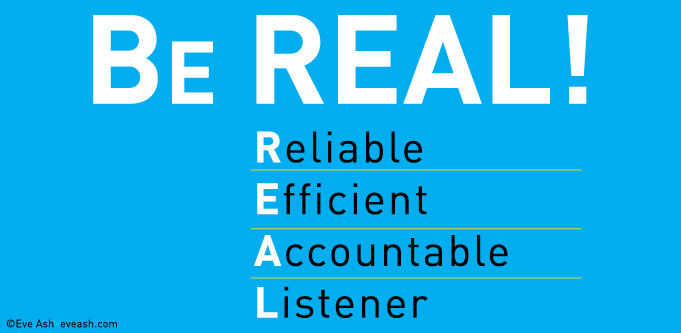No matter where you work or what position you occupy in the office hierarchy, it’s important to be real.
REAL: reliable, efficient, accountable and a listener.
Reliable
This boils down to doing what you say you’ll do, in a timely fashion. People who don’t — no matter what excuses they come up with (some border on emotional blackmail) — can’t be assessed as reliable. They may well be other things: brilliant, assertive, entrepreneurial, a master of information systems or anything else you care to name. But if they’re asked to do something and it doesn’t happen within the agreed timeframe, and this occurs rather too often, then case closed: that person cannot be relied on. Being reliable is the equivalent to sound construction principles. No amount of wolves huffing and puffing will cause your “house” to crumble, owing to cheapskate practices; it enhances your value.
Efficient
This involves getting something done in the most straightforward, least time-wasting and most useful way possible. Someone doing draft minutes on a laptop while a meeting takes place is clearly more efficient than typing them up later, with the outcome being that attendees receive their minutes fairly promptly (whether the minutes are effective as records of discussion may be another question). This demonstration of efficiency is maximised if everyone’s already agreed to the minutes template as a recipe for progressing activities on various fronts.
Efficiency operates in much the same way in other workplace and life situations. It’s a form of systematising actions that can be repeated to best effect. The trap lies in conflating efficiency with whether or not an exercise is worthwhile. Just because you’re efficient doesn’t mean what you’re doing is good or valid. So, try to think about what you’re doing while you do it … and for what results!
Accountable
Added to the above is the importance of being accountable. When you’re accountable, it means you have a healthy understanding of your role and being ready to answer for what you do, and/or knowing where the relevant authority ultimately resides. Organisations lacking clear and clearly-communicated lines of accountability are muddy places to work and you can be sure that it’s only a matter of time before something does go wrong, with buck-passing or scapegoating the inevitable result.
A listener
It’s amazing the amount of lip-service this quality attracts. Many managers pride themselves on being excellent listeners, except they often are not.
Consider Manager X who has a reputation for impatience. His/her mind works undeniably fast, he/she speaks rapidly and articulately, but his/her listening mode is geared for one thing — catching others out.
It’s not much use possessing lynx ears if yours is an adversarial mindset; that’s not listening. Listening improves when your mind and attitudes are receptive to hearing what others have to say, even if it’s unpalatable at times. If democracy is analogous to a conversation, so is listening. You and the other party are not talking to or at each other, you are conversing with each other. It takes practice, particularly if you’re like Manager X.
The good news is, you can give feedback! Quietly and tactfully point out to him/her the issues, give examples, and you will probably see a real effort to listen emerge. Manager X will be all the better for it, and in turn, people will want to listen to him/her, instead of playing a dead bat to the demands.
Who is the real you? How you measure up to the above attributes refines much of the answer that you alone can supply.
NOW READ: The A list: 6 steps to accountability in your business
NOW WATCH: Discussing Responsibilities, Understanding Accountability

